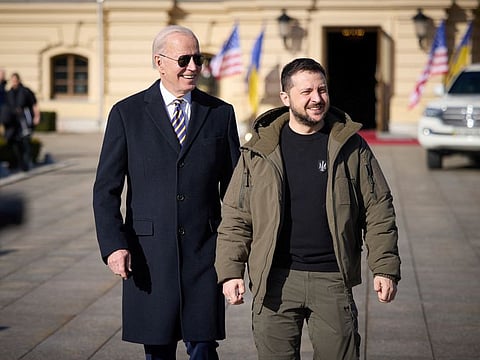US President Biden in Kyiv ahead of war anniversary, vows support as long as needed
Volodymyr Zelensky says he and Joe Biden discussed long-range weapons

US President Joe Biden made an unannounced visit to Kyiv on Monday, promising to stand with Ukraine as long as it takes, on a trip timed to upstage the Kremlin ahead of the one-year anniversary of Russia's invasion.
Biden, in aviator sunglasses, strode side-by-side with President Volodymyr Zelensky, in green battle fatigues, through central Kyiv to a gold-domed cathedral, on a bright winter morning pierced by air raid sirens.
"When Putin launched his invasion nearly one year ago, he thought Ukraine was weak and the West was divided. He thought he could outlast us. But he was dead wrong," Biden said.
"The cost that Ukraine has had to pay is extraordinarily high. Sacrifices have been far too great ... We know that there will be difficult days and weeks and years ahead." Outside the cathedral, burnt-out Russian tanks had been placed as a symbol of Moscow's failed assault on the capital at the outset of its invasion, when its forces swiftly reached the city's ramparts only to be turned back by unexpectedly fierce resistance.
Since then, tens of thousands of Ukrainian civilians and soldiers on both sides have died, cities have been reduced to rubble and millions of refugees have fled. Russia claims to have annexed nearly a fifth of Ukraine, while the West has committed tens of billions of dollars in military aid to Kyiv.
Further $500 million of weapons
The US president promised a further $500 million worth of weaponry, including artillery ammunition, anti-armour systems and air defence radars, plus tighter sanctions on Russia.
"This visit of the US president to Ukraine, the first for 15 years, is the most important visit in the entire history of Ukraine-US relations," Zelensky said.
Foreign Minister Dmitro Kuleba called the visit a "victory of the Ukrainian people and president Zelensky" and a clear signal to Russia that "no one is afraid of you!" It was clearly timed to upstage Russia's President Vladimir Putin, due to make a major address on Tuesday setting out aims for the second year of what he now calls a proxy war against the armed might of Washington and NATO.
"Of course for the Kremlin this will be seen as further proof that the United States has bet on Russia's strategic defeat in the war and that the war itself has turned irrevocably into a war between Russia and the West," said Tatiana Stanovaya, a Russian political analyst.
"Tomorrow's address was expected to be very hawkish, targeted at a demonstrative rupture of relations with the West. Now additional edits could be introduced to make it even tougher."
Winter offensive
The anniversary has taken on more than symbolic significance, becoming what the West views as the principal motivation for the war's deadliest phase, with Moscow hurling thousands of conscripts and mercenaries into a winter offensive.
Moscow received its own apparent signal of diplomatic support on Monday, with Chinese Foreign Minister Wang Yi expected in the Russian capital for talks. In public, China has so far remained neutral over the conflict despite signing a "no limits" friendship pact with Russia weeks before the invasion.
Washington has said in recent days it is concerned Beijing could begin supplying Moscow with arms. Chinese Foreign Ministry spokesperson Wang Wenbin said the United States was "in no position to make demands of China", and China's "comprehensive collaborative partnership with Russia" was a matter for two independent states.
Russia is trying to secure full control of two eastern provinces forming Ukraine's Donbas industrial region. It has launched assaults at locations running from Kreminna in the north down to Vuhledar in the south, securing its biggest gains around the mining city of Bakhmut.
Kyiv, which is absorbing a major influx of Western weaponry in coming months for a planned counter-offensive, has lately stuck mainly to defence on the battlefield, claiming to be inflicting huge casualties on the assaulting Russian forces.
Sign up for the Daily Briefing
Get the latest news and updates straight to your inbox



